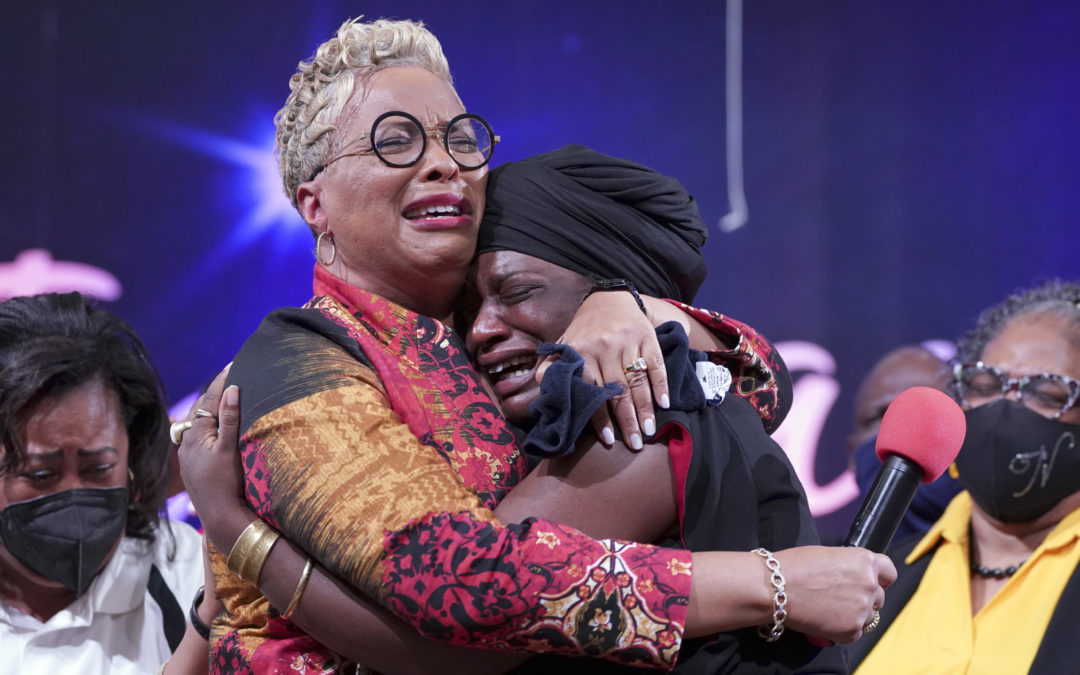
by Adelle Banks, RNS and Peter Smith, AP | Dec 9, 2021 | Commentary, Headline News |
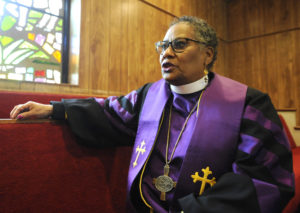
Bishop Teresa Jefferson-Snorton of the Christian Methodist Episcopal Church is shown at Moody Temple CME Church in Fairfield, Ala., on Tuesday, Nov. 16, 2021. Jefferson-Snorton is the CME Church’s first and only woman bishop. (AP Photo/Jay Reeves)
When an opening for bishop arose in the Christian Methodist Episcopal Church in 2010, Teresa Jefferson-Snorton looked around to see if any women were offering to be candidates.
None were.
She knew that since its founding 140 years earlier by Black Methodists emerging from slavery, the denomination had never elected a woman bishop.
“I was like, oh my goodness, this can’t be,” she recalled. “If no one steps forward, it gives the church a pass.”
Jefferson-Snorton, who had spent decades as a pastor, chaplain and theological educator, undertook several months of intensive prayer before discerning she was “feeling a call to this” from God. Then she put her name forward.
“To an extent, it was a political statement,” said Jefferson-Snorton.
Despite opposition from some who said the denomination wasn’t ready for a woman bishop, she was elected the CME’s 59th bishop, overseeing 217 churches across Alabama and Florida.
___
This story is part of a series by The Associated Press and Religion News Service on women’s roles in male-led religions.
___
Jefferson-Snorton said people there have come to accept her in the role — if awkwardly at times.
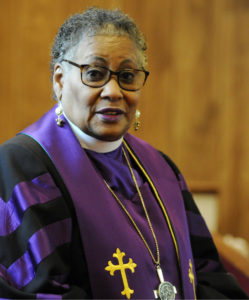
Bishop Teresa Jefferson-Snorton of the Christian Methodist Episcopal Church is shown at Moody Temple CME Church in Fairfield, Ala., on Tuesday, Nov. 16, 2021. Jefferson-Snorton is the CME Church’s first and only woman bishop. (AP Photo/Jay Reeves)
“I can’t tell you how many times people said, ‘Yes sir,’ to me,” she said. “I just remind them, ‘Yes ma’am’ is OK.”
Eleven years later, she remains the CME’s only woman bishop, a status made vivid in an official photo of the church’s college of bishops, where she sits among 16 men, all in purple and white vestments.
Most major Black Christian denominations in the U.S. have no doctrinal bar to ordained women leaders in the way that Catholicism and some other denominations do, and women have preached and been ordained in historically Black churches since at least the 19th century.
Yet denominational leadership remained all-male until the 21st century, and women are still the exception in the top rungs.
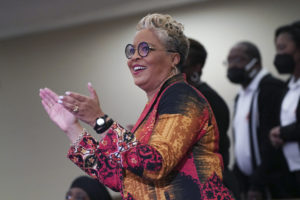
The Rev. Gina Stewart, senior pastor of Christ Missionary Baptist Church, leads a worship service Dec. 5, 2021, in Memphis, Tenn. Stewart is the first female president of a major Black Baptist organization, the Lott Carey Baptist Foreign Mission Society. (AP Photo/Karen Pulfer Focht)
Earlier this year, the Rev. Gina Stewart became the first woman president of a major Black Baptist organization, the Lott Carey Baptist Foreign Mission Society, an organization that responds to disasters and fights poverty, hunger and human trafficking.
“Whenever a woman is placed in a role that is traditionally male, there’s always some negativity that surrounds it,” Stewart said, but in her first 90 days as president, she has received congratulatory calls from some male denominational leaders and support from her male predecessors, without encountering “any major resistance.”
“There’s a shifting taking place,” Stewart said, noting that more women have been promoted to lead important departments in the church.
“We know that it’s long overdue,” added Stewart, who is the senior pastor of Christ Missionary Baptist Church in Memphis, Tennessee. “But we give those organizations that are making the effort credit, taking the initiative and giving women that opportunity.”
Religious organizations still need to do more to provide women chances for leadership development, said the Rev. Maisha Handy, associate professor of religion and education at the Interdenominational Theological Center, a consortium of historically African American seminaries in Atlanta.
“We’ve certainly made strides around that in recent years, in recent decades, but we still have a long way to go,” said Handy, who is also executive director of the Center for Black Women’s Justice at ITC.
Women pastors often receive assignments to smaller congregations with fewer resources or opportunities to gain experience and preparation for denominational leadership, Handy said.
“It’s not just about ordination. It’s about placement,” said Handy.
When Black denominations got their start in the late 18th and early 19th centuries, according to Handy, their biblical interpretations were affected by the cultural attitudes around them. “When you think about the kind of patriarchy and misogyny that is intrinsic to American history and culture, it makes sense that it was reflected also in those denominations,” she said.
To be sure, women have long exercised authority in non-ordained roles, outnumbering men in local church membership and also leading their own organizations within denominations.
But from the first, women had limited access to the pulpit, though some challenged those barriers.
“If the man may preach, because the savior died for him, why not the woman?” Jarena Lee, the first woman lay preacher in the African Methodist Episcopal Church, asked in the early 19th century.
A sister denomination, the African Methodist Episcopal Zion Church, ordained Mary Small, its first woman minister, in 1898. By the mid-20th century, the CME and AME churches were ordaining women as well. Records are less precise among the more decentralized Baptists, but women’s ordination was long the exception among them.
In 2000, Vashti Murphy McKenzie was elected the first woman bishop in the AME Church. McKenzie, now retired, was later joined by more women bishops, though men still comprise most of the AME episcopacy. The AME Zion Church followed, electing Mildred “Bonnie” Hines bishop in 2008, as did the CME with Jefferson-Snorton in 2010.
Jefferson-Snorton, who in October was elected chair of the governing board of the National Council of Churches, said she is still sometimes questioned about biblical passages that are cited to justify giving men sole power to preach or lead. She cites other passages, such as one declaring that in Christ there is neither male nor female.
“I often start with the story of Resurrection morning,” when Jesus’ female followers were told to “go and proclaim” he had risen from the dead, she added.
“If Jesus had not intended for women to be bearers of good news, that would never have happened,” said Jefferson-Snorton.
But to those who are “more hostile” in questioning women’s ministry, “I often say to them, ‘God called me to this ministry, so if you have a problem with it, you need to talk to God, because I did not call myself,'” she said.
In the Church of God in Christ, a historically Black Pentecostal denomination, women have made their influence felt in other ways. Traditionally only men have been recognized as ordained ministers or bishops, while women have led its Women’s Department, which oversees auxiliaries. COGIC officials didn’t respond to questions about women’s roles in the denomination.
But after the death of her husband, COGIC’s first elected presiding bishop, Mother Mary P. Patterson, a retired real estate agent who headed her own travel agency, founded the Pentecostal Heritage Connection, dedicated to planting historical markers honoring COGIC leaders across the South. In November, a ceremony unveiling the final marker, an 8-foot aluminum sign on a corner in Little Rock, Arkansas, was attended by regional religious leaders, a representative of the governor and scholars who traveled to the state for the occasion.
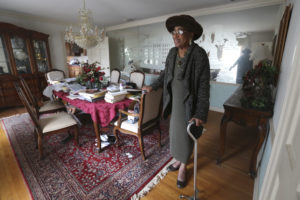
Mother Mary Patterson, poses at her dining room table in her Memphis, Tenn., home Dec. 1, 2021. The material on the table was used by Patterson in her recent campaign to post historical markers about Church of God in Christ leaders. In the Church of God in Christ, where only men have traditionally been recognized as ordained ministers or as bishops, women like Patterson have nevertheless played key roles in its Women’s Department — which oversees auxiliaries — and in other ways. (AP Photo/Karen Pulfer Focht)
Sherry Sherrod DuPree, a Florida historian and former president of the Society for Pentecostal Studies, said Patterson’s effort is an example of how women lead in a denomination known for its patriarchal hierarchy.
“She is a quiet praying lady who ‘stays in her lane’ but is active in getting jobs done without fanfare, one of the skills of COGIC women,” said DuPree.
Patterson said, “it shows other young women that you don’t have to be behind the pulpit in order to do a work for the Lord.”
___
Associated Press religion coverage receives support from the Lilly Endowment through The Conversation U.S. The AP is solely responsible for this content.

by Associated Press | Dec 9, 2021 | Headline News |
Video Courtesy of Congressional Black Caucus Foundation
The headlines are screaming that Generation Z, born from the mid- to late 1990s to somewhere around 2010, is the least religious generation in recorded history.
More than a third of these teenagers and early 20-somethings are “nones,” meaning they identify as atheist, agnostic, or “nothing in particular” on a survey.
And within that umbrella group, the percentage who are atheists is twice that of the general population, according to research by the Barna Group (from 6% of all Americans to 13% of Gen Zers).
James Emery White, a megachurch pastor in North Carolina, gives voice to his considerable anxiety about all this in Meet Generation Z: Understanding and Reaching the New Post-Christian World.
Spoiler alert: I strongly disliked this book.
In the guise of helping pastors, parents, and teachers “understand” and “reach out” to Generation Z, this book showcases the very problems it tells readers to avoid. White chides church leaders for clinging to the models of previous generations (door-to-door evangelism, large events) even while demonstrating a remarkable tone deafness to the deeper concerns of this generation (racism, homophobia, violence in schools, and the list goes on).
White begins the book by drawing on standard research from Pew, Gallup, and Barna to demonstrate the scope of the problem—young adults going AWOL from religion if they ever had religion in the first place. So far, so good as books go; White can be a clear and effective writer when he’s not lazily quoting his own previous books ad nauseam.
And then things get vague. The church needs to be “countercultural,” he asserts, but he has an easier time telling us what this isn’t than what it is. It’s not the Benedict Option, in which Christians withdraw from society and politics; it’s not fundamentalism, which is a thoroughgoing rejection of the modern world; it’s not the tactic of the religious right, which is to politicize the bejesus out of faith.
Instead, countercultural means for “the church to be the church” and “truly Christlike.” Which is nice, but tells us nothing.
I’d be more likely to give White the benefit of the doubt about counterculturalism if he weren’t showing on every page that his Christianity is not, in fact, countercultural. It’s bowing to a very specific 1950s American Christianity. So it’s “countercultural” by the measures of today, but not in a good way.
Consider what he has to say about women. To reach Generation Z, he tells readers, it’s important to “target men” first and foremost. His church (which he reminds us many times has been successfully growing despite the godless landscape of . . . um, North Carolina, the nation’s tenth-most-religious state) “unashamedly” puts men first in its marketing materials, sermons, music choices, and décor.
What does it mean to target men? It means you think about male sensibilities in terms of music and message, vocabulary and style. . . . When I give a message, I talk like a man talks, specifically, the way a man talks with other men. Direct and maybe a little rough around the edges. But men talk football, not fashion. So I cater to a man’s humor, his interests, his world, his way of thinking, his questions. (148)
If you can reach men, he says, women and children will follow (“if you get the man, you get everyone else within his orbit”).
There are some real problems with this argument. First, this is supposed to be a book about reaching people in their teens and early twenties. One of the major shifts in American culture is that many adults are delaying marriage until their 30s or not getting married at all. So this whole evangelistic focus on older men with wives and children totally ignores the demographic we purchased this book to learn more about.
Second, he never thinks to challenge the patriarchal structure that would dictate that if you can get a man to church, his wife and children will automatically and obediently follow: If it worked in America in the 1950s, by golly, it’s surely good enough for us now!
What’s especially myopic about that lack of self-awareness is that this is supposed to be a book about “understanding” Generation Z. But this is a generation that can sniff out inequality and white male privilege like a basset hound, God bless them. They care about diversity and inclusion, even to the point where they don’t want to work for companies that don’t share those values.
Why, then, would White assume Gen Zers would fall in line with churches that so obviously disregard gender equality? If they won’t be associated with the old boys’ club when they’re getting a paycheck for it, why would they do so on their own time?
Third, the advice to “target men” may be having the opposite long-term effect from what White wants, which is more butts in the pews. There’s solid longitudinal evidence that young women are now leaving religion at even higher rates than young men—which is a reversal from previous generations. This exodus is likely due to many factors, but it’s not hard to imagine that enduring a childhood of sermons that drew proudly upon hypermasculine football metaphors and assumptions that women were considered less important may play a part. Just thinking out loud here.
It’s not just in this particularly egregious “target men” section that White’s lack of concern for women is made clear; it’s pervasive in the book’s citations and assumptions. He quotes or mentions five men for every woman (yes, I counted). And almost everyone he quotes, male or female, is white. He gives the obligatory nod to MLK, and then . . . nothing. As though African Americans have had little of value to say in 50 years.
We have to do better than this. And doing better begins with an activity White doesn’t seem to have engaged in much: listening to Generation Z directly.
Talking less and learning more.
Not just calling them to account for their generational sins, but being sensitive to the way they rightly call bullshit on their elders.
Related posts:
Why Millennials are really leaving religion (it’s not just politics, folks)
The best book about Millennials and the church
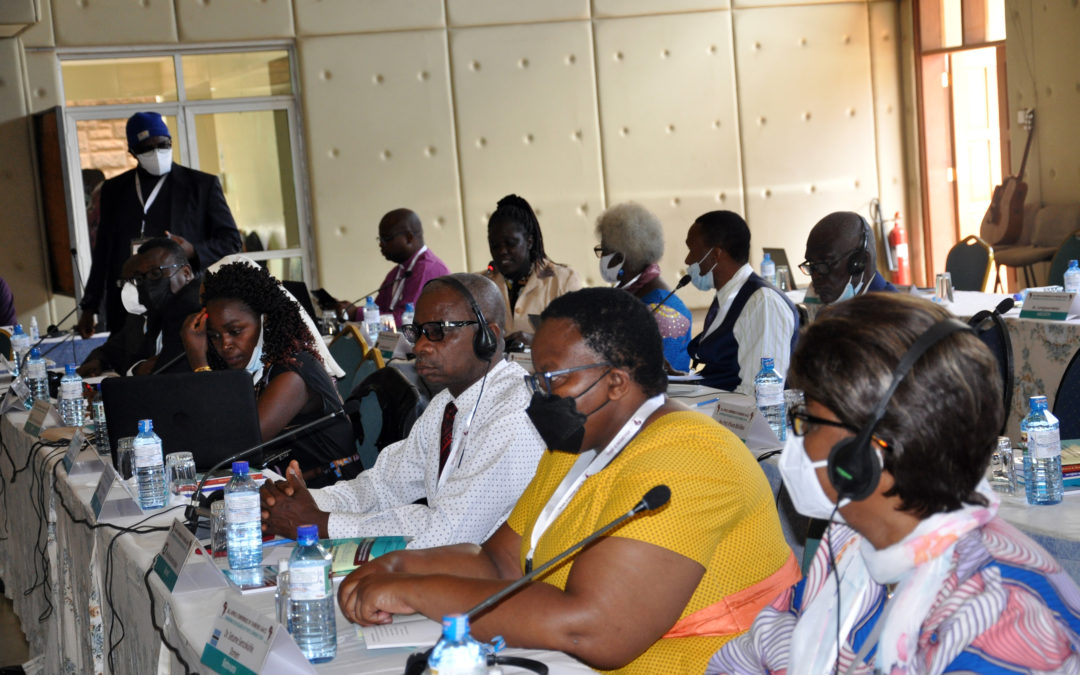
by Fredrick Nzwili, RNS | Dec 8, 2021 | Headline News |
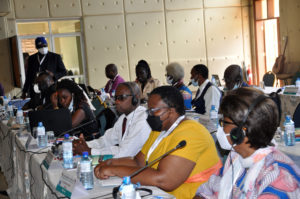
Participants at the 3rd Symposium on Misleading Theologies sit in a session on Nov. 22, 2021, in Nairobi, Kenya. RNS photo by Fredrick Nzwili
NAIROBI, Kenya (RNS) — When some African church pastors ordered their followers to eat grass or gulp petrol or even drink poison-laced water, their congregations have obeyed the instructions, thinking the practices would bring them closer to God.
Many other pastors take their wellness advice a notch higher, claiming to heal conditions such as disability and barrenness and diseases such as HIV and AIDS, and, more recently, coronavirus. It’s not unheard of for pastors to hold their congregations spellbound as they promise to bring the dead back to life.
In recent years the All Africa Conference of Churches, an umbrella group for several Protestant denominations on the continent, has moved to combat theological claims that harm Christians, holding a series of symposiums to educate clergy and unify their churches against faith healing and other practices.
“All these pronunciations, fake testimonies and things like these are really destructive. They are not life-giving, but life frustrating,” said the Rev. Fidon Mwombeki, a Tanzanian Lutheran pastor who is the general secretary of the AACC.
Based in Nairobi, the AACC is the continent’s largest association of Protestant, Anglican, Orthodox and Indigenous churches and has a presence in 42 countries. It brings together churches, national councils of churches, theological and lay training institutions and other Christian organizations.
Since 2019, the group has organized three symposiums in which theologians, clerics and lay Christians have met to explore the subject of misinformation. Some of the themes tackled in the prior conferences include power and authority, wealth and poverty, government regulation of religious organizations, and health and healing.
“If we don’t pay attention, (misleading theologies) will undermine human dignity and put the lives of people at stake. You see in some churches the minister sending people out to eat grass. This is unacceptable,” said the Rev. Bosela Eale of the Democratic Republic of the Congo, AACC’s director of theology, interfaith relations and leadership, at the most recent Nov. 22-24 symposium, held in Nairobi.
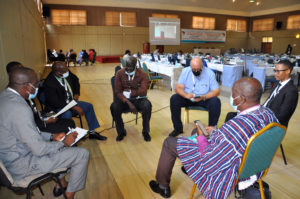
Participants at the 3rd Symposium on Misleading Theologies in Nairobi, Kenya, hold group discussions on Nov. 22, 2021. RNS photo by Fredrick Nzwili
The theologians are warning against dangerous teachings and practices, such as: the prosperity gospel; sexual abuses in demonic exorcism and blessing for fertility; the use of toxic substances and liquids in religious rites; and demanding huge sums of money for prayers and pastoral services, among others.
Religious observers say many of the worst abuses of theology come in faith healing.
The Rev. Simangaliso Kumalo, an associate professor of religion and governance at the University of KwaZulu-Natal-Pietermaritzburg, warns that the popular belief that Jesus cures every sickness poses challenges for managing epidemics, pointing to Pentecostal churches that have, he said, spiritualized COVID-19.
“For them, the corona is not a mere virus,” Kumalo told the conference. Pastors preach that, “because members of Pentecostal churches are children of God, the virus would not infect them, or if it does, they would be healed by Jesus, the physician.”
He highlighted conspiracy theories that say viruses such as COVID-19 are God’s punishment to disobedient humanity.
Monica Nambaba, an official at the Africa Christian Health Associations Platform, said spurious teachings about health have hurt Africans in the past. “Some people with conditions such as HIV have died after religious leaders told them to stop medication after attending healing prayers,” she said.
Pastors should instead be conscious of their power to sway people’s attitudes about health measures. “If the religious leaders can use their platforms to correct this, it will go a long way in helping the communities,” Nambaba said.
According to Veronica Ngum Ndi, a disability and development professional from Cameroon, people with disabilities are particularly vulnerable to faith healing attempts. Telling a person with a permanent disability that God will one day allow them to walk again is destructive, she said, and commanding them to drop their crutches because they have been cured, as some pastors do, can only worsen their problems. “Some have been injured badly in the process,” said Ndi.
At the same time, some of the church leaders and theologians at the symposium advocated for a reconsideration of African traditional healing practices, many of which have been suppressed or lost in the continent’s missionary era.
“We are referring to those aspects that make traditional healing practices beneficial. These aspects must be recovered because they are not incompatible with the gospel,” said the Rev. Herve Djilo Kuate, a pastor in the Evangelical Church of Cameroon.
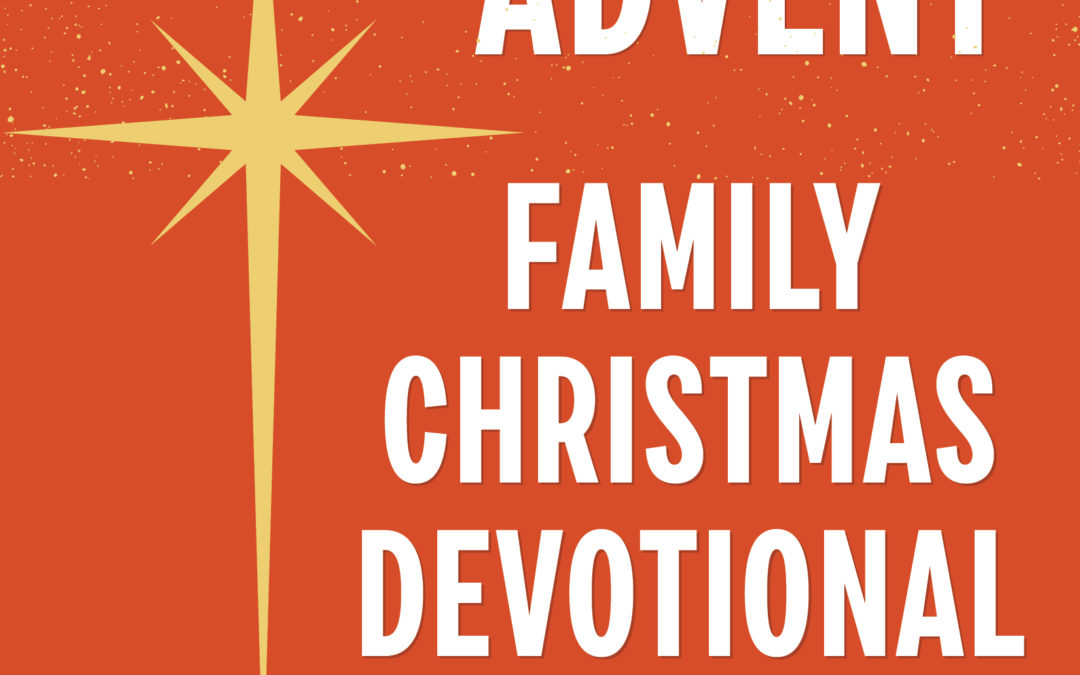
by Allen Reynolds, UrbanFaith Editor | Dec 7, 2021 | Headline News, Prayers & Devotionals |
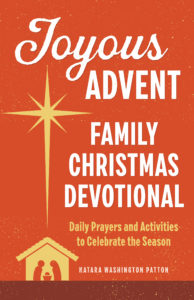 Advent is a wonderful time for reflection and devotion as believers look forward to Christmas and its significance for our faith. UrbanFaith had the opportunity to have a Q & A session with Katara Washington Patton, the author of Joyous Advent: Family Christmas Devotional. The exchange is below, edited for clarity.
Advent is a wonderful time for reflection and devotion as believers look forward to Christmas and its significance for our faith. UrbanFaith had the opportunity to have a Q & A session with Katara Washington Patton, the author of Joyous Advent: Family Christmas Devotional. The exchange is below, edited for clarity.
It is so good to have you share with UrbanFaith again and your new and relevant book. Advent is a great opportunity to reflect, be inspired, and deepen our relationship with God and others, so I’m grateful for your book.
1. A lot of people are not as familiar with Advent as some of the other major holidays such as Christmas and Easter. What is Advent and why is it important for believers?
Advent is the period leading up to the observance of our Savior’s birth–Christmas; Advent is observed during the four weeks before Christmas and normally begins the last Sunday of November. Advent means to anticipate the coming of Christ (remembering how people anticipated His birth and how we anticipate His second coming).
2. What inspired you to write a book of devotionals for this holiday season?
I love devotionals; they have been one of my main sources of growth. They are shorter readings you can do mostly every day, which increases your faith through reading and reflecting on Scripture. So, whenever I’m given the opportunity—as I was by my publisher with this book—I jump at the chance to write material that can help people grow in faith. This one particularly is for the entire family…so adults and children can learn from it.
3. You were very intentional at making this a FAMILY devotional, why is that important to you?
We know Family can mean…grandmother and child, two parents and children, auntie, uncle, big sister, etc. So I like the fact that families—whatever your definition is—can center themselves around a scripture and reading and explore its meaning, have activities to do. This can be done alone as well but it is written at a level children will understand too. I think that’s important…for my family, my child has a different Christian education than I did. I went to Sunday school every Sunday because my mom was the superintendent and my dad a teacher; today, pre-pandemic, my child was in a class at church maybe once a month or so (due to several reasons like the format of classes at our church); and now with the changes due to capacity limits and the pandemic, she’s not in a class. Where does she learn those fundamental lessons we learned? In family devotions, I hope and pray.
4. I love the format of your devotions, why did you decide to include activities as well as the traditional prayer and Scripture inspirations?
I’ve always been a person who looks at learning and even ministry from a practical stand point. If I can’t apply this lesson to my life, then it’s just words. Activities help reinforce the application of the lesson. I’m always going to look for a way to bring home the point through activities.
5. How has choosing devotion during Advent and Christmas impacted your faith journey?
I loved rediscovering many of the stories I selected: Jesus’ genealogy, Simeon and Anna, even Noah and the rainbow, Elizabeth and Mary, even Abigail and David– all to drive home the four themes of Advent: hope, peace, joy, and love. I think we need to tell these stories over and over again to remind ourselves and to teach our children of the goodness of God and the amazing faith journey we have been presented with as we journey ourselves. Utilizing these devotions can also help us connect the faith stories within the Bible to our own faith story based on our belief in our savior’s birth.
6. What advice would you give to our audience who may be trying to grow in their faith?
Other than read my books?! Lol. Honestly, read your Bible and supplemental material of your choosing faithfully. If you find one devotional or book isn’t giving you enough or inspiring you to read regularly, find another. There are so many different formats we can utilize for Bible reading and devotions that you can find something that is speaking to you in the moment. Being consistent is key. I enjoy waking up and having that time with God; I understand it may be car time for another or bed time or lunch time for others—but the consistent practice of carving out that time to study, reflect, and pray has been my saving grace.
Joyous Advent: Family Christmas Devotional is available everywhere books are sold.
by Jaimie Crumley | Dec 5, 2021 | Headline News |
“Do not neglect to show hospitality to strangers, for by doing that some have entertained angels without knowing it” (Hebrews 13:2, NIV).
Have you ever known someone who never meets a stranger?
Folks who live their lives in such a way that nearly everyone they meet becomes a new friend astound me with their generosity of spirit. I admire their courage and zest for life, which compels them to embrace even those they do not know well, knowing that each creature has gifts to share with the world.
As a faith leader, when I meet folks with those sorts of spirits, I see some of the Spirit of Christ who, although divine, shared meals with the poor, sick, and sinful, laid hands on the infirm, and drew close to the crowds without reservation.
Even in His dying moment, Jesus stretched His arms wide as though embracing all of us and declared forgiveness over us because we did not realize what we were doing. Jesus is the embodiment of the grace of hospitality, and I would argue that hospitality is the biggest gift we, the body of Christ, can offer the world right now.
The Fear Factor
The current social and political climates have caused me to take a step back to examine what Scripture teaches us about welcoming strangers among us. I confess that I focus much of my time concerning myself with the sins that other people perpetrate on each other. I concentrate on the news stories about hate crimes without giving much consideration to the ways that I allow hate and fear to fuel my actions.
The truth is that fear motivates so much of what we do. Our fears prevent us from loving and practicing hospitality in the ways that our faith demands of us. In today’s social media culture, many of us have a fear of rejection. As humans, many of us also have a fear of not knowing which prevents us from meeting new people and having new experiences.
We also often have fears of being powerless that cause us to try to stay in places that make us feel powerful. We allow our fears to impede upon our ability to love.
Before turning outward and critiquing national and international leaders, I want to encourage us, especially during this introspective liturgical season called Lent, to look within to ask ourselves how we are practicing the kind of hospitality that Scripture and the example of Jesus Christ demand of us.
Love Thy Neighbor?
Many of us have learned the classic stories about hospitality in Sunday School and Sunday morning sermons.
We have heard about Abraham and Sarah, who unknowingly hosted angels who foretold the birth of Sarah’s son. In the passage from Hebrews I cited at the top of this article, the author alludes to that passage from Genesis. Despite the many admonitions throughout the Hebrew Bible to care for the foreigner, widow, and orphan, we, like the lawyer in Luke 10, often ask, “Who is my neighbor?”
In response to that question, we have heard Luke’s well-known story of the Good Samaritan who, despite his vastly different culture and faith, cared for an Israelite stranger he found injured on the side of the road. Even after hearing such a dramatic story of sacrificial love, we continue to struggle with caring for our neighbors. Perhaps my favorite aspect of the story is the way it condemns us for the times we fail to show love to people who are just like us.
We have become politically motivated to care for immigrants in recent months, as we should, but we mistreat those who sit right next to us in the pew or who share our offices at work!
Jesus tells Israelite listeners the story of an Israelite man who was robbed as he traveled from Jerusalem to Jericho. A priest passed by and walked on the opposite side of the road to avoid helping. Then, a Levite, a religious leader from the priestly tribe of Levi, passed him. Only a Samaritan, a man who was from a different culture and faith background, cared for the man.
Many commentaries have explained that the priest and the Levite probably did not interact with the victim because of concerns about ritual purity, but does that not cause us to consider our priorities? We cannot prioritize legalism over mercy and love. Here was Jesus, the Lamb of God who takes away the sins of the world, essentially urging His listeners to ritually defile themselves because mercy is at the heart of the Gospel.
The Missing Link
 What the world needs from the church is for us to be the church. The time is now for us to commit ourselves to following Jesus Christ in our actions. It was the way the early Church first began to thrive.
What the world needs from the church is for us to be the church. The time is now for us to commit ourselves to following Jesus Christ in our actions. It was the way the early Church first began to thrive.
As J. Ellsworth Kalas puts it in his book The Story Continues: The Acts of the Apostles for Today, “The Christian church was born in a time and culture when the marketplace of beliefs was crowded to its borders. Religion was everywhere … This meant that it was easy to talk religion, but also that it was difficult for the decision to get serious. No wonder, then, that the followers of Christ were known as ‘people of the Way.’”
The earliest Christians stood out, and they increased in number because they lived their Christianity; for them, it was not simply an interesting intellectual idea. They attracted converts because of their countercultural way of viewing religion as more than a list of philosophies.
Rev. Dr. Martin Luther King Jr. provided a practical understanding of this concept in his sermon “A Knock at Midnight,” which appears in his 1963 book of sermons called Strength to Love. King preached, “The church must be reminded that it is not the master or the servant of the state, but rather the conscience of the state … if the church will free itself from the shackles of a deadening status quo, and, recovering its great historic mission, will speak and act fearlessly and insistently in terms of justice and peace, it will enkindle the imagination of mankind and fire the souls of men, imbuing them with a glowing and ardent love for truth, justice, and peace.”
In other words, from the Scripture we read, to the prayers we pray, to the songs we sing, our worship is real and lived and must transform us from the inside out. The church is not a place to go; the church is a thing to do. We call the physical buildings in which we worship churches, but the church is the body of Christ, at work in the world.
So, what does living our faith teach us about hospitality?
A Place Where Ministry Happens
One of my mentors in ministry began a new pastorate at the end of 2016. After examining the needs and challenges of ministry at her new church, she chose as her theme of her church “Radical Hospitality.” The new framework of thinking about the church as a place where radical hospitality happens has changed it in practical ways in just a few short months.
Church members are beginning to imagine their worship space as first and foremost a place where ministry happens. That sounds obvious, I know, but so many churches have gotten away from thinking of themselves as being ministry spaces above all else.
One of the most drastic changes she has made as pastor has been to reimagine the parsonage, the house that is owned by the church for use by pastors and their families. That house now serves a dual purpose. It is both a “meeting house” where retreats, Bible study, and meetings can occur, and it provides accommodations for the pastor and visiting ministers.
Knowing my colleague, and understanding what it means to be “radical,” I am expecting that in the months and years to come, her new ministry will continue to grow and transform to become more welcoming for all people.
It is our task, as the Samaritan did in the Gospel of Luke, to embrace all we meet. As Hebrews 13:2 reminds us, we do not know the actual identity of those we encounter each day. Scripture teaches us that if we open our hearts to the possibility, each stranger has gifts to share with us that will enhance our lives. My fellow people of the Way, let us go forward with joy to spread Christian hospitality.
Jaimie Crumley is a minister, blogger, podcaster, and ministry consultant. She blogs about race, gender, history, and Christian faith at iamfreeagent.com.
Share your thoughts on ministry and hospitality below.











 Advent is a wonderful time for reflection and devotion as believers look forward to Christmas and its significance for our faith. UrbanFaith had the opportunity to have a Q & A session with Katara Washington Patton, the author of Joyous Advent: Family Christmas Devotional. The exchange is below, edited for clarity.
Advent is a wonderful time for reflection and devotion as believers look forward to Christmas and its significance for our faith. UrbanFaith had the opportunity to have a Q & A session with Katara Washington Patton, the author of Joyous Advent: Family Christmas Devotional. The exchange is below, edited for clarity. What the world needs from the church is for us to be the church. The time is now for us to commit ourselves to following Jesus Christ in our actions. It was the way the early Church first began to thrive.
What the world needs from the church is for us to be the church. The time is now for us to commit ourselves to following Jesus Christ in our actions. It was the way the early Church first began to thrive.